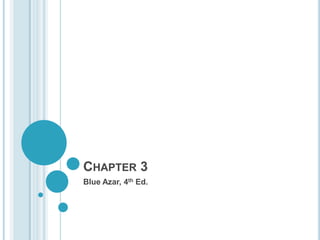
Present Perfect Tense Chapter
- 1. Chapter 3 Blue Azar, 4th Ed.
- 2. 3-1: Present Perfect Tense HAVE / HAS + past participle She has taken six classes. They have taken six classes. Y/N Question: Has she taken six classes? HAVE / HAS + subject + past participle Wh- Question: What classes has she taken? WH- word + (noun) + HAVE / HAS + subject + past participle
- 3. 3-1: Present Perfect They have taken six classes since last quarter. Joe has played soccer since he was five years old. Jane has worked hard since she graduated. Bob has lived in California for three months. The students have studied grammar for one week. Sue has known Sarah for many years. Which sentences talk about a specific point in time? 1, 2, 3 (since + specific point OR since + subject + verb) Which sentences talk about a length of time? 4, 5, 6 (for + length of time) Do Ex. 4
- 4. 3-1: Present Perfect for Unspecified time Have you ever been to Las Vegas? No, I’ve never been to Vegas. Has Bill signed up for the trip yet? Yes, he has already signed up for it. No, he still hasn’tsigned up for it. Do you know exactly when these events happened or didn’t happen? No. Thus, use the present perfect tense. Which sentences have an adverb clue? All. Ever, never, yet, already, and still are often used with present perfect.
- 5. 3-1: Present Perfectfor a Repeated Event Which states have you visited? I havevisited three states so far. What is the repeated event? visiting three states What is the key word?
- 6. 3-1: Present Perfect Exercise 9, p. 41 Write 4 sentences using the following: for, since, an adverb clue, and “so far” Write 3 TRUE sentences and 1 FALSE sentence. Example: I have played the piano for 10 years. I have had five jobs since I moved to California. I still haven’t seen a movie star. At UCI, I have taught six classes so far.
- 7. 3-3: Present Perfect vs. Simple Past I’ve flown in an airplane. I flew in an airplane last month. There have been many car accidents on this road. There was an accident here yesterday. Which sentences talk about an indefinite time in the past? Which form of the verb is used? 1, 3 (present perfect) Which sentences talk about an definite time in the past? Which form of the verb is used? 2, 4 (simple past)
- 8. 3-4: Present Perfect Progressive Tense HAVE / HAS + BEEN + verb + ing Mike is studying English. Bob and Ann have been playing tennis for six years. They have been practicing Kung Fu all morning. Malia has been wearing contact lenses since she turned sixteen. What is the difference between #1 and 2, 3, 4? #1 expresses action happening right now #2, 3, 4 express HOW LONG action has been in progress
- 9. 3-4: Present Perfect Progressive Tense HAVE / HAS + BEEN + verb + ing Mike is studying English. Bob and Ann have been playing tennis for six years. They have been practicing Kung Fu all morning. Malia has been wearing contact lenses since she turned sixteen. What time expressions are used with each present perfect progressive tense? for, all, since
- 10. 3-4 Present Perfect Progressive**SPECIAL** I’vebeen living in California for three years. I’ve lived in California for three years. I’ve been teaching English for a few years. I’ve taught English for a few years. I’vebeen playing the piano since I was five. I’ve played the piano since I was five. What is the difference between each pair of sentences? No difference; Either tense can be used with verbs: live, work, teach, study, wear glasses, play chess, etc.
- 11. 3-5: Past Perfect HAD + past participle I called for help because a tree had fallen across my driveway. Which clause expresses the earlier event? the tree fell What verb form is in the clause that expresses the earlier event? Past Perfect What verb form is in the clause that expresses the later event? Simple Past
- 12. 3-5: Past Perfect The thief had escaped We had calmed down He had been upstairs We hadn’t noticed *SPECIAL* After I had called the police, before I calledthe police. by the time the police came. when we came home. until we heard the footsteps. we realized the thief was gone. Past Perfect (1st event) Simple Past (2nd event)
- 13. 3-5: Past Perfect*SPECIAL* --before / after -- The thief had escaped The thief escaped *SPECIAL* After I had called the police, After I calledthe police, before I calledthe police. before I calledthe police. we realized the thief was gone. we realized the thief was gone. Past Perfect (1st event) Simple Past (2nd event)
- 14. 3-7: Past Perfect Progressive HAD + BEEN + verb + ing Joe had been working for ten hours by the time he left his office. Which clause expresses the earlier event? work What verb form is in the clause that expresses the earlier event? Past Perfect Progressive What verb form is in the clause that expresses the later event? Simple Past
- 15. 3-7: Past Perfect Progressive Joe had been watering the garden Ellen had been working for two years Because Sue had been studying all night, before I arrived. when she went back to school. she looked very tired. Past Perfect Progressive (1st event) Simple Past (2nd event)